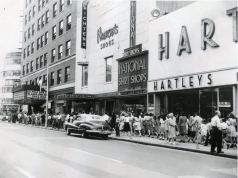Juan Vicente Gonzalez went to five stores last week in a semi-successful hunt for food and other supplies for his family. He is the only one who leaves the house these days.
The Broward County resident said his wife stays home to watch their two kids. Having only one of them go out was the safest route.
“Supermarkets are super crowded because people are buying everything,” said Gonzalez.
He tries to do most of his shopping on weekdays in the early morning before going to work. Fridays and weekends are more crowded. But even in the morning, there is a limit of supplies and he can’t always get what he needs. One time, he saw someone putting at least six packages of toilet paper in their truck.
In Miami-Dade County, like so many other places in the country, toilet paper, Clorox wipes and some food products are scarce. At a Target in West Kendall, the produce aisle Sunday was almost out of eggs, meat, milk and frozen foods. Aisles for paper towels and toilet paper were also empty.
Covid-19, the disease caused by the novel coronavirus, causes upper respiratory and breathing issues, generally not stomach or bowel problems, making the run on toilet paper seem irrational. But sociologists say the drive for bulk buying stems to have some kind of influence, no matter how minor, in these unstable times.
“People are trying to gain control of an unpredictable situation,” said Queens College Professor Anna Maria Bounds. “They’re trying to do something to help alleviate their fear.”
As of Wednesday, more than 55,000 people have been diagnosed with the disease in the United States and 802 have died. In Florida, about 1,500 have been diagnosed and 20 have died.
People are buying to prepare for the worst. Similar to a hurricane, essential items are going out of stock because of concerns they will soon not be available.
But the difference is the expectations. During a hurricane, people buy extra under the assumption there will be an electrical or water system failure or interruption, said FIU Professor Kevin Grove.
“[For the coronavirus] you should be buying in case you need to stay home,” he said.
Grove said he recently went to a Target near his house to buy coloring books for his kids but couldn’t find any. Part of the overbuying comes from the growing panic, he said.
“Stuff you wouldn’t expect people to buy out is getting bought out,” he said, adding that people shouldn’t be panicking. “You’re seeing people buy with the expectation that something is going to go wrong.”
Despite reports of price gouging, Bounds said she thinks that almost everyone who is packing their home shelves with hundreds of rolls of toilet paper and dozens of bottle of hand sanitizer do not have a profit motive for doing so.
“I believe that a majority of people who are out there shopping are trying to protect their families,” said Bounds.
Just like them, Gonzalez is buying supplies to protect his loved ones. He doesn’t shop online for certain items because they are too expensive. A four pack of travel sized hand sanitizers was being sold for $19 on Amazon. Another vendor was selling eight rolls of toilet paper for $15.99, not including shipping and handling.
“It’s frustrating,” he said, “Because I know there are people who also need it.”
































